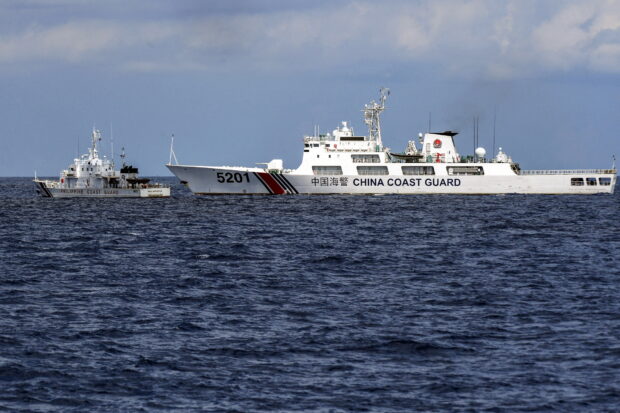China on arbitral ruling on WPS: Illegal, null and void

This photo taken on April 23, 2023, shows the Philippine Coast Guard vessel BRP Malapascua
(left) maneuvering as a Chinese coast guard ship cuts its path at Ayungin (Second Thomas) Shoal in the Spratly Islands in the disputed South China Sea. —AFP
MANILA, Philippines — The landmark arbitral ruling on the West Philippine Sea (WPS) is illegal, null, and void,” the Chinese Embassy in Manila said as the Philippines marls the seventh anniversary since the decision was handed down.

Defiant
“China’s position on the so-called South China Sea arbitration and the award is consistent, clear and firm. The Arbitral Tribunal gravely violated Unclos and general international law. The award is illegal, null, and void,” the Embassy said in a statement on Wednesday.
“China does not accept or recognize it, and will never accept any claim or action based on the award. China’s sovereignty and relevant rights and interests in the South China Sea were established in the long course of history and are solidly grounded in history and the law. This shall under no circumstances be affected by any illegal award.”
“US pressure”
The Chinese embassy also slammed the United States as they believe that Washington is using the issue to “exert pressure and force China into accepting the award.”
“As the mastermind behind the South China Sea arbitration, the US ropes in allies to play up the issue each year on the anniversary of the illegal award to gang up against China and to exert pressure, and force China into accepting the award.
“We are firmly against this. We urge these countries outside the region to respect China’s territorial sovereignty and maritime rights and interests in the South China Sea, stop using the South China Sea issue to drive wedges among regional countries, and refrain from being a troublemaker to peace and stability in the South China Sea,” it continued.
PH legal victory
The Philippines in 2013, challenged before the Permanent Court of Arbitration (PCA) Beijing’s claim that it owned more than 80 percent of the entire South China Sea through the so-called nine-dash line, which overlaps with the Philippines 200-nautical mile exclusive economic zone (EEZ) mandated by the 1982 United Nations Convention on the Law of the Sea (Unclos).
But on July 12, 2016, the PCA invalidated China’s claim to almost the entire South China Sea, ruling that China’s claim had no basis in international law and that it had violated the Philippines’ sovereign right to fish and explore resources in the West Philippine Sea, the waters within the country’s 370-kilometer EEZ in the South China Sea.
The European Union (EU) delegation in the Philippines and 16 of the 27 EU member countries also reaffirmed their support for the 2016 ruling through a joint statement, calling it a “significant milestone.”
Protecting PH territory
The Armed Forces of the Philippines (AFP)’s Western Command hailed the arbitral ruling which they vowed to enforce to protect “every inch of the country’s territory and the riches in our exclusive economic zone.”
gsg
For comprehensive coverage, in-depth analysis, visit our special page for West Philippine Sea updates. Stay informed with articles, videos, and expert opinions.